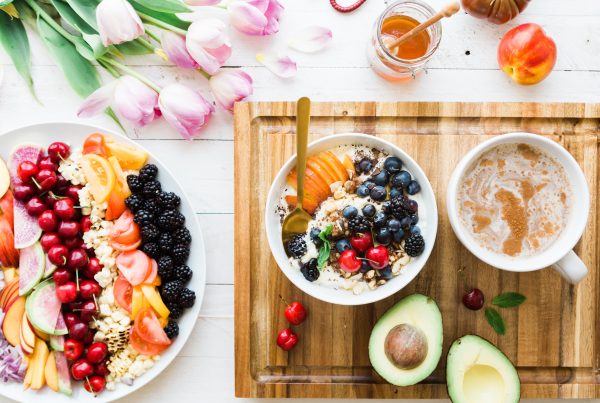Hormones — such as estrogen, adrenaline, and insulin — are extremely important chemical messengers that affect many aspects of your overall health. Hormones are secreted by various glands and organs, including your thyroid, adrenals, pituitary, ovaries, testicles, and pancreas. The entire endocrine system works together to control the level of hormones circulating throughout your body, and if one or more is even slightly imbalanced, it can cause widespread major health problems.
Step 1: Swap Carbs for Healthy Fats
Eating a variety of foods high in short, medium and long-chain fatty acids is key to keeping your hormones in check. Your body needs various types of fats to create hormones, including saturated fat and cholesterol. Not only are these essential fats fundamental building blocks for hormone production, but they keep inflammation levels low, boost your metabolism and promote weight loss. Healthy fats have the opposite effect of refined carbohydrates, which lead to inflammation and can mess with the balance of your hormones.
Step 2: Use Adaptogen Herbs
Adaptogen herbs are a unique class of healing plants that promote hormone balance and protect the body from a wide variety of diseases, including those caused by excess stress. In addition to boosting immune function and combating stress, research shows that various adaptogens — such as ashwagandha, medicinal mushrooms, Rhodiola and holy basil.
Step 3: Address Emotional Imbalances
According to Traditional Chinese Medicine, internal emotions have a direct impact on a person’s health and addressing emotional imbalances, external factors and lifestyle choices can help to prevent health conditions associated with hormonal imbalances.
Step 4: Use Essential Oils
To balance your hormones naturally, it’s important that you eliminate toxins in your body by avoiding conventional body care products that are made with potentially-harmful chemicals including DEA, parabens, propylene glycol and sodium lauryl sulfate. A better alternative is to use natural products made with ingredients like essential oils, coconut oil, shea butter and castor oil.
Step 5: Supplement to Fill Nutritional Voids
It’s sometimes necessary to supplement in order to fill nutritional voids that can be leading to a hormone imbalance. Here are the top supplements that I recommend for your hormones:
- Evening primrose oil: Evening primrose oil contains omega-6 fatty acids, such as LA and GLA, that support overall hormonal function. Supplementing with evening primrose oil can help to relieve premenstrual and PCOS symptoms. It also helps to create a healthy environment for conception.
- Vitamin D: Vitamin D almost acts like a hormone inside the body and has important implications for keeping inflammation levels low. This is why people who live in dark areas often suffer from seasonal depression and other health problems unless they supplement with vitamin D. Sunshine is really the best way to optimize vitamin D levels because your bare skin actually makes vitamin D on its own when exposed to even small amounts of direct sunlight. Most people should supplement with around 2,000–5,000 IU daily of vitamin D3 if they live in dark areas, during the winter, and on days when they’re not in the sun.
- Bone broth: Bone broth soothes the digestive system and supplies the body with nutrients that can be easily absorbed. Consuming bone broth or protein powder made from bone broth is especially beneficial to your health because it contains healing compounds like collagen, proline, glycine, and glutamine, which have the powder to boost your overall health.
- Probiotics: Probiotics can aid in repairing your gut lining, which in turn can balance your hormones. When undigested food particles, like gluten, for example, leak through your gut into your bloodstream, it causes disease-causing inflammation that impacts the entire body — especially glands like the thyroid that is very susceptible to heightened inflammation. Most people with leaky gut have a deficiency of probiotics in their guts. Probiotics are healthy bacteria that can actually improve your production and regulation of key hormones like insulin, ghrelin, and leptin.
Step 6: Beware of Medications and Birth Control
Are you aware of your medication’s side effects? Some can disrupt your hormone balance, leading to side effects like fatigue, appetite changes, altered sleeping patterns, low libido, sadness and even depression. Some medications that can mess with your hormone balance include corticosteroids, stimulants, statins, dopamine agonists, rexinoids, and glucocorticoids. Beware of your medications, talk to your doctor about the side effects and research natural alternatives whenever possible.
Step 7: Get More Sleep
Unless you get 7–8 hours of sleep every night, you’re doing your body no favors. A lack of sleep or disturbing your natural circadian rhythm can be one of the worst habits contributing to a hormone imbalance. How so? Because your hormones work on a schedule! Case in point: Cortisol, the primary “stress hormone,” is regulated at midnight. Therefore, people who go to bed late never truly get a break from their sympathetic flight/fight stress response.
Artcile from: https://draxe.com/10-ways-balance-hormones-naturally/




